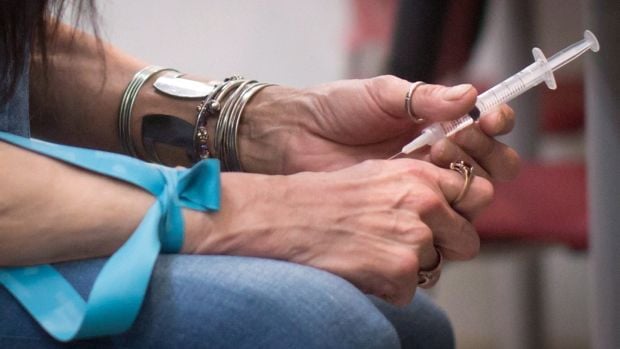
B.C. is now the first province in Canada to have registered nurses (RNs) on track to begin prescribing addiction treatment medications for opioid use disorder.
It’s part of B.C.’s overdose response plan, 30 RNs and registered psychiatric nurses (RPNs) are on their way to completing their training this month to prescribe buprenorphine/naloxone (commonly known as Suboxone), which is a first-line opioid agonist treatment (OAT) medication.
The Province says this is the first step in a phased approach to expand RNs and RPNs’ scope of practice to include prescribing addiction treatment medications.
“We are coming up on five years since British Columbia declared overdose a public health emergency, and more than 6,000 people have died because of toxic street drugs since that time,” said provincial health officer Dr. Bonnie Henry. “This crisis isn’t unique to our province – it’s a national issue – but B.C. is breaking ground when it comes to our response.”
This change follows Henry’s public health order to authorize RNs and RPNs to prescribe some controlled drugs and substances. RNs and RPNs now join family physicians, psychiatrists and nurse practitioners who are already prescribing OAT medications.
Training will continue with additional cohorts and will advance to include other medications, such as slow-release oral morphine and methadone, to meet the needs of more patients.
“Too many people in our province are grieving the loss of someone they love, and far too many people remain at risk of overdose. Highly toxic street drugs are rampant, and we must separate people from these dangerous, unpredictable drugs,” said Sheila Malcolmson, Minister of Mental Health and Addictions. “Expanding access to addiction treatment medications is essential to getting a handle on this crisis.”
B.C. is the first province in Canada to authorize RNs and RPNs to prescribe controlled drugs and substances.
Given the complexities of opioid use disorder and OAT, Henry’s order stated that RNs and RPNs must meet numerous requirements before they can begin prescribing addiction treatment medications.
This involves completing training established by the BC Centre on Substance Use, including in-person mentoring with experienced prescribers. Additionally, work has been done to establish the regulatory requirements needed for RNs and RPNs to diagnose, order, refer and prescribe.
The first cohort of nurses, representing every health region, have met these requirements.
The Province says it’s also trying to expand access to safer pharmaceutical alternatives to toxic street drugs.
Enhancing B.C.’s response to the overdose crisis is part of A Pathway to Hope, B.C.’s roadmap for building the comprehensive system of mental health and addictions care for British Columbians.
READ MORE: B.C. facing ‘record-breaking year’ as drug overdose deaths in November surpass 150 mark



